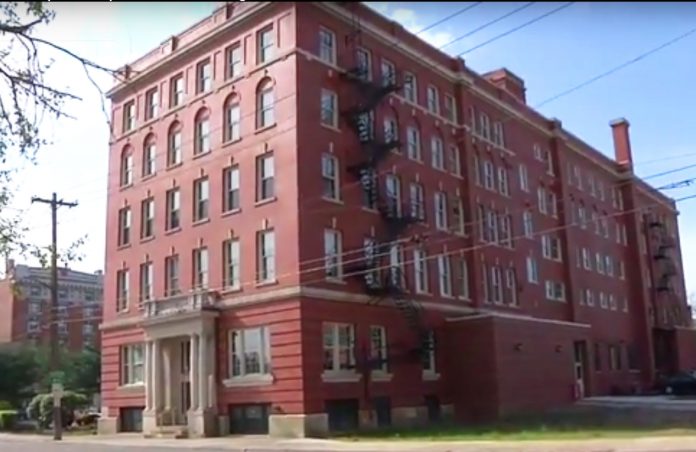
YWCA of Youngstown renovation nears completion | The YWCA Board of Directors began planning the project in 1996 following a feasibility study.
One century ago, after raising $150,000, several members of the city’s most prominent families established a permanent space for the fledgling YWCA of Youngstown: a five-story brick structure on West Rayen Avenue. Constructed in 1911 and dedicated one year later, the building has since been central to the organization’s programs and services. However, in recent years, the structure has often hindered, rather than helped, efficient fulfillment of the YWCA’s mission.
“The women of the community needed a place for women and families. [The YWCA has] been many things for many people and has seen many uses throughout the years,” said Leah Brooks, development director of the YWCA. “It’s a symbol of women’s history, of the women leaders of our community. But it was in need of a facelift.”
Subsequently, in August, the YWCA of Youngstown began an ambitious $10 million renovation and restoration of the historic building that has functioned, at various times in the past 100 years, as a homeless shelter, a place of worship and a center for childcare, education, health and recreation, social activities and women affected by crisis.
The YWCA Board of Directors began planning the project in 1996 after a feasibility study determined renovation of the existing structure more economical than demolition and new construction. Eight years later, the board recommitted to that idea and started searching for an architectural firm to present a visual plan of the renovation. The board chose local architect Paul Ricciuti, primarily for his experience with preserving and adaptively reusing historic buildings.
“[The structure] is very, very sound,” Ricciuti said. “It’s part of the fabric of Youngstown. We’ve torn down too many historic buildings in our community. It’s a major, major plus for our community that the board decided to stay there.”
Approximately $9 million has been committed to the project. In 2007, the YWCA received $3.2 million from the Ohio Housing Finance Agency in low-income housing tax credits to renovate a portion of the structure, said Constance Shaffer, executive director of the YWCA. She noted that this award was followed by $1.4 million in historic preservation tax credits, $1 million in state historic preservation tax credits, $1 million from the Federal Home Loan Bank, $750,000 from the Ohio Housing Trust Fund, $700,000 from a Clean Ohio grant and $400,000 from the city of Youngstown. The project has also received assistance from the YWCA’s capital campaign and is seeking further community support and donations.
“It’s all been tough,” Shaffer said of financing the project. “It’s never a sure thing. Government grants and the stimulus made the project possible. [We had] the majority of money coming through that way.”
Despite some funding struggles and the project’s inherent risks and challenges, Shaffer stressed the need for up-to-date permanent supportive housing, primarily for those who require “help in maintaining homes.”
“It was not a great environment,” Shaffer said of the building before the project’s start. “It was too hot, too cold, there were things breaking. It was not very modern.”
To better meet the contemporary needs of YWCA residents, the structure’s 36 dormitory-style single bedrooms — which featured common bathrooms, living rooms and kitchens — have been transformed into 30 handicapped-accessible one-bedroom and efficiency apartments for low-income single women. Each unit provides a private bathroom and kitchen facility and ranges in size from 450 to 700 square feet, Brooks said.
“Privacy is important. It’s hard enough for students to live like that, let alone grown women,” Brooks said of the previous housing conditions. “[The new apartments] are cozy; they feel like more of a home.”
All apartments feature several amenities, including a refrigerator, a stove, a phone, Internet, cable, plenty of storage space, heat and air conditioning. Prior to the renovation, residents relied on shared air-conditioning units installed in each floor’s community lounge and one thermostat that controlled temperature settings for the entire building. Now, residents can adjust rooms to their personal comfort levels.
The updated residential space spreads across the top three floors and a portion of the second. Construction should be complete by September or October, while all 30 apartments will likely be rented and leased by December, Brooks said. Licensed social workers will provide on-site supportive services for residents.
This comprehensive effort also includes restoration of the structure’s original two-story gymnasium, which will be used as a community all-purpose room. Areas adjacent to the gymnasium have been designated as small group meeting rooms, restrooms and a kitchen. The YWCA’s health outreach staff will be housed there, but building residents, YWCA program participants and the public are encouraged to use the space, Brooks said.
The public will also be welcomed into the YWCA’s first-floor lobby, which is being restored to its 1911 appearance. Historic elements of the structure were preserved, following state and federal historic preservation standards. What could not be preserved or was otherwise unavailable had to be replicated.
Layers of paint have been stripped from the original woodwork and fireplaces, while multi-pane windows have been installed for historical accuracy, Brooks said. The lobby will also feature a cyber cafe, complete with Wi-Fi, and a limited food service operation.
“[The lobby] will be for public use, a public area. We’ve had public programs, but this will bring more of a traffic [to the building],” Brooks said.
First-floor space will also be used for retail operations, start-up space for women- and minority-owned businesses, case-management support for clients and partnerships with local government, businesses and training programs.
The former pool building, which stood between the YWCA and the new Williamson College of Business Administration, has been demolished. An enclosed garden will take its place.
Plans are also in place to further develop the YWCA’s childcare center. A new children’s center will feature an outdoor playground, developmental assessments, therapy and specialized services for children with disabilities. These services target children aged 6 weeks to 12 years, including those with special needs.
Other additions and improvements include activity rooms, a fitness area and computer labs. More efficient and economical operating systems, such as new wiring and plumbing, were installed.
“We’re gutting out the old and putting in new,” Brooks said. “It creates a healthier environment for staff, residents and the public. When people come in here, even members of our own board, they’re amazed.”
Prior to the project’s start, Brooks recalled questioning the YWCA’s downtown location.
“Do we belong here? Do we belong in the suburbs?” Brooks asked. “But we have a value here, a value downtown. We’re very much involved with community revitalization and the renaissance of the community. The community response to this transition, this transformation, has been very positive.”
Metro Monthly is a local news and events magazine based in Youngstown, Ohio. Stay connected with news, features and essential Valley events. Be sure to visit the Metro Monthly Calendar for concerts, family activities, sports, museums, Mill Creek Park activities and more. We circulate throughout the Mahoning Valley (and beyond) with print, online and flipbook editions. We offer print and website advertising. Office: 330-259-0435.
© 2010 Metro Monthly. All rights reserved.






